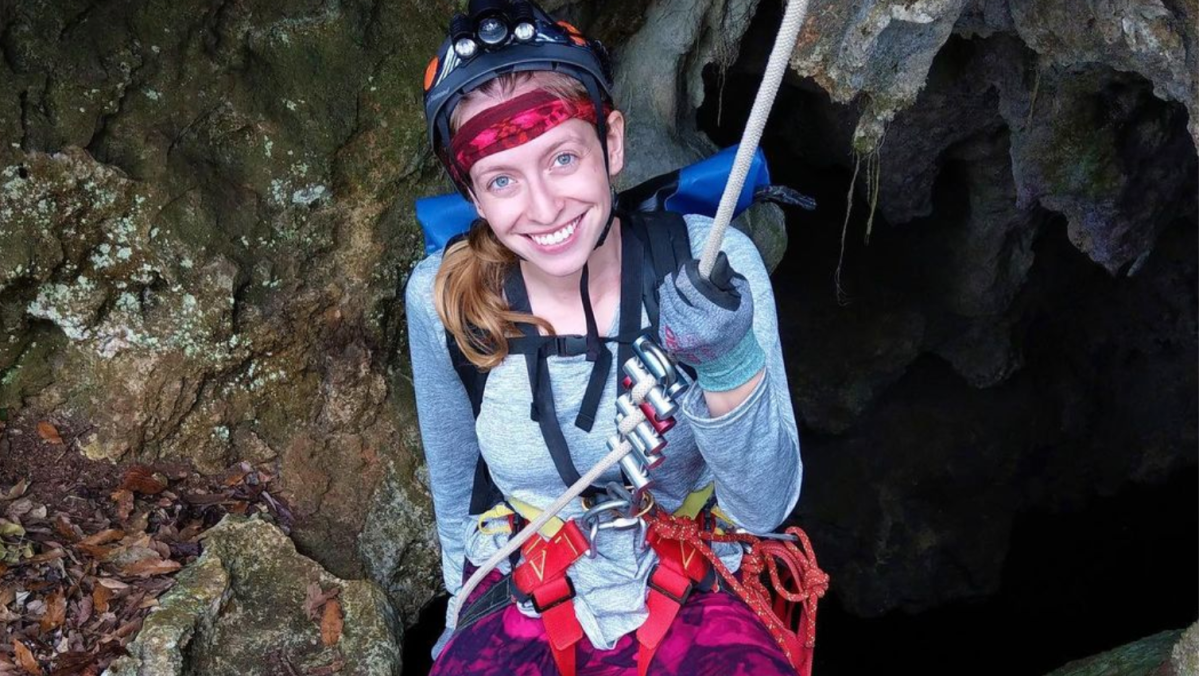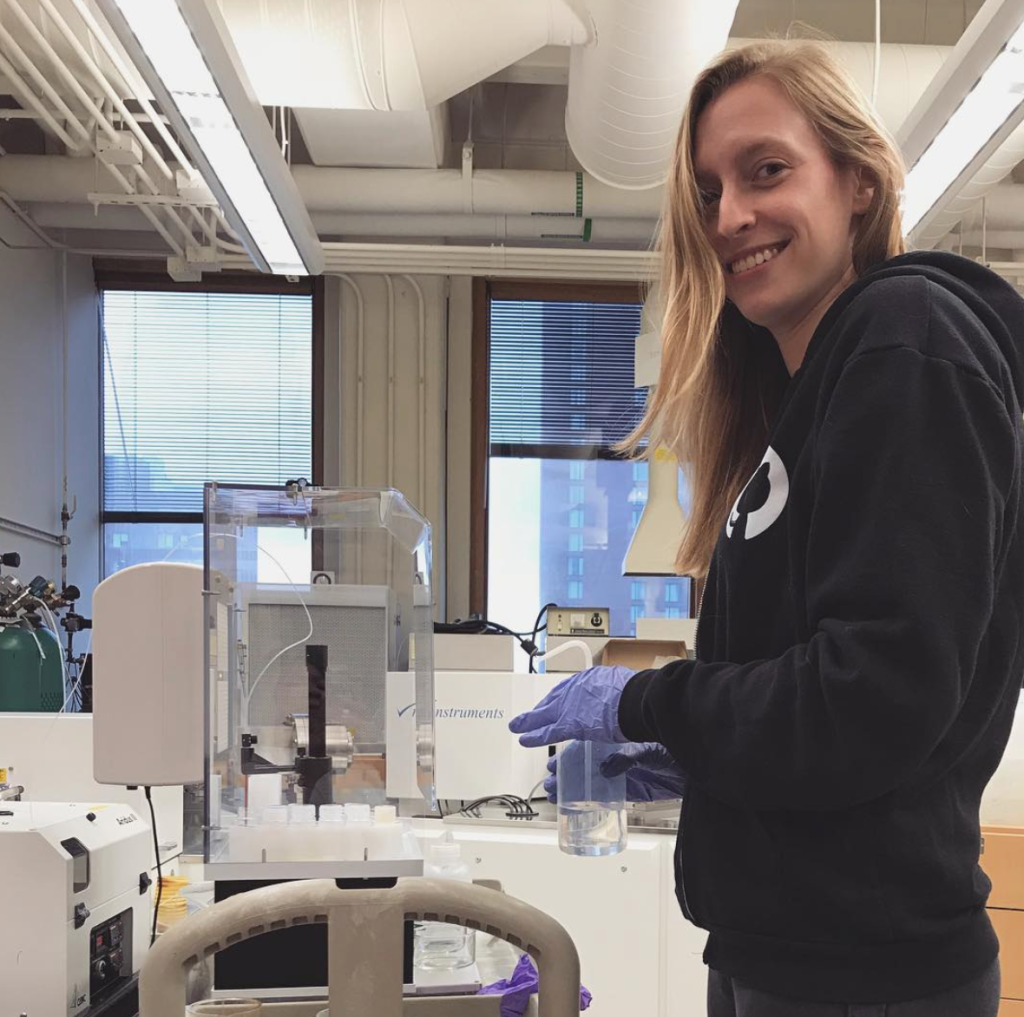
Written by Hayden Gillooly S’19
Hayden is a senior Geoscience major at Williams College, with concentrations in Spanish and Maritime Studies. She is a Spring 2019 alumni of the Williams-Mystic Program.
Through the phone, I could almost tell she was smiling and that her eyes were lighting up, and she described the experience of exploring stalagmites in Mexico. Gabi Serrato Marks F’13 speaks with contagious enthusiasm and a warm openness.
Gabi recently earned her Ph.D. in marine geology from the MIT-WHOI joint program, where she studied Mexican stalagmites to understand past climate change. She is currently working as a science writer and communicator, along with doing advocacy work to increase accessibility in the sciences.
Gabi is deeply passionate about research, “What’s really cool is being the first person in the whole world to know how old that stalagmite is. And maybe not everyone cares how old it is, but it’s cool to be the first person to know that.” She said that “Williams-Mystic was what drove me to research. I was an undergraduate at Bowdoin and interested in the liberal arts aspect of Williams-Mystic and its interdisciplinary nature. It worked really well because I am now mostly working as a science writer, so I’m applying those same interdisciplinary lenses to writing.”
F’13 was a part of the only semester that traveled to Hawaii on a field seminar, and it ended up being more of an adventure than the program bargained for because they went during a government shutdown. The Williams-Mystic faculty and staff were actively reorganizing and replanning while already in Hawaii. Still, Gabi said the trip was exceptional, “Especially coming from a geoscience background, Hawaii is the dream.” Though F’13 did not go to Louisiana, Gabi was still able to experience the culture of southern Louisiana on a trip to LUMCON during graduate school.
Gabi, like I, noted that visiting Louisiana reshaped how she thought about climate change. Before going, she wondered “why people would stay in southern Louisiana if they keep getting hit by hurricanes,” but after a few days at LUMCON, realized that these issues are much more complicated and nuanced than they may first appear.
Gabi discussed the importance of increasing diversity in the field of Geosciences, noting that she perhaps does not fit the traditional stereotype of a geoscientist, “I was definitely not always interested in earth sciences. I’m not super outdoorsy. I’m outdoorsy in the ‘nature is pretty’ way, not the dig in the dirt kind of way. So I think that breaking the idea that a geoscientist has to be a certain way or do a certain thing would be helpful.” People from cities or people from flat areas without much topography cannot explore geology and the outdoors in the same way as people who live in the countryside. Gabi explained that making “geoscience curriculum relevant to students wherever they are” could be a crucial way to increase the field’s diversity.
In her second year of graduate school, Gabi was diagnosed with Ehlers-Danlos syndrome, which has significantly impacted her life through chronic pain and fatigue which “makes it difficult to pursue a typical academic path” She is no longer doing fieldwork because it is too physically intensive and draining. Gabi does advocacy “to show how it’s possible to be a scientist with a disability,” but also grapples with the fact that due to her disability, she was unable to make a research-driven science career work for her.
While the coronavirus pandemic has increased the accessibility for some people, it has added burdens to others. “It depends on the type of disability. It’s all about access needs. For my friend who is deaf, she cannot lip read when people wear masks. So working in-person for her is impossible. But for me and people who have migraines, staring at a screen all day is really hard. However, not commuting is better.” It’s all about “balancing access needs and prioritizing accessibility and having open communication.”
Gabi reflected on her Williams-Mystic experience, “Being on the SSV [Robert C.] Seamans [for the offshore field seminar] was amazing and I learned so much, and I don’t think I’d be able to participate now. I don’t think my doctors and my captain would say that it’s safe for me to be on a ship. Ships are a place where it’s accepted that you have to be physically fit. And I don’t know how I feel about that. I can see how me being on board would be hard for me, but not having those experiences is also detrimental.”
Gabi and I agreed that we love science, but recognize that the field can be improved. Gabi explained the value of integrating various forms of knowledge into science. She says that we should shift away from what her friend calls “parachute science” in which scientists go to a location to conduct research “for a week or a month and you leave and you are the author of the paper and maybe put local guides in the acknowledgments.” She said, “I think that is frustrating and wrong. I think it’s important to put everyone who contributed to the knowledge as authors: cave guides, locals who helped collect water as researchers, as authors on that specific publication. This helps add their expertise to the scientific records in a way that gives respect.” Gabi said that the best advice she’s received was that regardless of what we do in life, people will always have things to say, whether it be positive or negative, but that “We should try to still make the changes that we think are important.”
I asked Gabi how we can improve science, and who needs to be the driver of change. She said that “Undergrads are an important place [for sparking change] because it’s where people begin to build their careers.” Gabi loves “helping people connect the dots” such as “working with people who realize they really love research and didn’t think they could do it.” She fuels this passion by mentoring undergraduate students and high school students.
Gabi believes that resource sharing partnerships between big universities and small universities “could help the excellent students have more opportunities and see themselves as researchers.” “Some people say that science doesn’t care where you’re from or what you look like, but that’s a naive look at the world.” The reality is that there is often an underlying privilege to being a part of the scientific community because of the cost of equipment, fieldwork, and tools. We must all recognize and acknowledge that truth, so that we can all be more intentional about creating accessible, welcoming, diverse and encouraging work and school spaces.
My conversation with Gabi made me think about all of the ways in which we can all work harder to be more understanding of people with disabilities and to work towards increasing accessibility in our respective disciplines. We should weave options into academic curriculums, trip-planning, and social events, accounting for diverse student experiences.
“People don’t understand how I went ‘abroad’ to Connecticut, but it was a great choice and shaped how I think now.”



